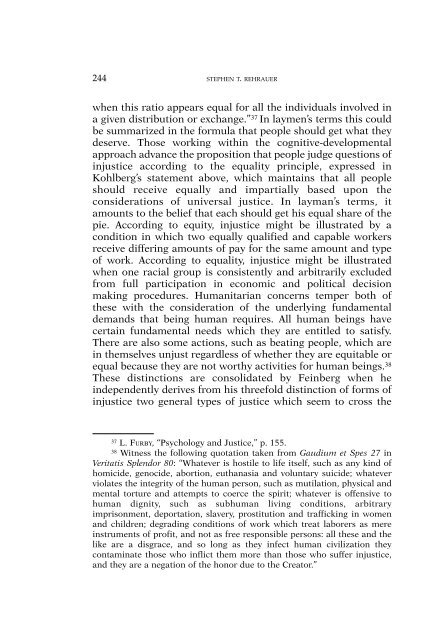Vol. XXXVIII / 1 - Studia Moralia
Vol. XXXVIII / 1 - Studia Moralia
Vol. XXXVIII / 1 - Studia Moralia
You also want an ePaper? Increase the reach of your titles
YUMPU automatically turns print PDFs into web optimized ePapers that Google loves.
244 STEPHEN T. REHRAUER<br />
when this ratio appears equal for all the individuals involved in<br />
a given distribution or exchange.” 37 In laymen’s terms this could<br />
be summarized in the formula that people should get what they<br />
deserve. Those working within the cognitive-developmental<br />
approach advance the proposition that people judge questions of<br />
injustice according to the equality principle, expressed in<br />
Kohlberg’s statement above, which maintains that all people<br />
should receive equally and impartially based upon the<br />
considerations of universal justice. In layman’s terms, it<br />
amounts to the belief that each should get his equal share of the<br />
pie. According to equity, injustice might be illustrated by a<br />
condition in which two equally qualified and capable workers<br />
receive differing amounts of pay for the same amount and type<br />
of work. According to equality, injustice might be illustrated<br />
when one racial group is consistently and arbitrarily excluded<br />
from full participation in economic and political decision<br />
making procedures. Humanitarian concerns temper both of<br />
these with the consideration of the underlying fundamental<br />
demands that being human requires. All human beings have<br />
certain fundamental needs which they are entitled to satisfy.<br />
There are also some actions, such as beating people, which are<br />
in themselves unjust regardless of whether they are equitable or<br />
equal because they are not worthy activities for human beings. 38<br />
These distinctions are consolidated by Feinberg when he<br />
independently derives from his threefold distinction of forms of<br />
injustice two general types of justice which seem to cross the<br />
37<br />
L. FURBY, “Psychology and Justice,” p. 155.<br />
38<br />
Witness the following quotation taken from Gaudium et Spes 27 in<br />
Veritatis Splendor 80: “Whatever is hostile to life itself, such as any kind of<br />
homicide, genocide, abortion, euthanasia and voluntary suicide; whatever<br />
violates the integrity of the human person, such as mutilation, physical and<br />
mental torture and attempts to coerce the spirit; whatever is offensive to<br />
human dignity, such as subhuman living conditions, arbitrary<br />
imprisonment, deportation, slavery, prostitution and trafficking in women<br />
and children; degrading conditions of work which treat laborers as mere<br />
instruments of profit, and not as free responsible persons: all these and the<br />
like are a disgrace, and so long as they infect human civilization they<br />
contaminate those who inflict them more than those who suffer injustice,<br />
and they are a negation of the honor due to the Creator.”
















